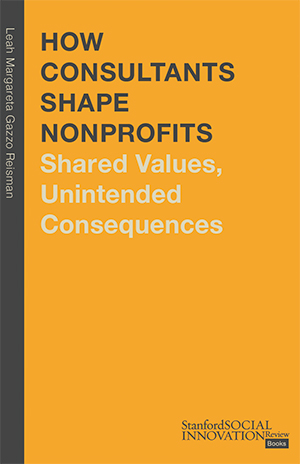Nonprofit Consultants for the Status Quo

Consultants and Nonprofits: Unpacking the Dynamics of Shared Values and Unintended Consequences
Introduction
In times of crisis, doubt, or opportunity, countless nonprofits seek the guidance of consultants. These strategic advisors come in all shapes and sizes, ranging from large multinational firms to small, independent practitioners. They provide a wide spectrum of services, from strategic planning to program evaluation, fundraising, and board development.
Despite their prevalence in the nonprofit sector, little is understood about the day-to-day operations of consultants or their impact on the sector. Leah Reisman's new book, How Consultants Shape Nonprofits, delves into the work of strategy consultants who work with nonprofits, aiming to equip both consultants and nonprofits with the knowledge to work together more effectively.
Context and Stakes
Before exploring the world of nonprofit consultants, it's crucial to understand the origins and nature of consulting. Management consulting dates back to the early 1900s, with roots in scientific management and engineering. Consultants offer corporations and organizations expertise and solutions in areas where they lack in-house capabilities.
In the 1950s, management consulting made its way into the nonprofit sector, initially targeting large organizations like universities. Later, in the 1980s, it spread to the public sector, guided by the belief that similar management techniques could apply to both sectors.
Consultants and Corporate Management
Extensive research has been conducted on the role of consultants in corporate management. These studies have identified the following key points:
- Consultants provide managerial solutions and legitimacy to their clients.
- They help manage uncertainty for clients while simultaneously introducing additional uncertainty.
- Consultant-client interactions are crucial for understanding consulting processes.
- Consultants play a role in the transmission and application of business ideas within organizations.
Consultants and Nonprofits: A Different Landscape
Despite the vast body of research on corporate consulting, little is known about consultants who specialize in nonprofit organizations. This is partly due to an erroneous assumption that consulting practices are uniform across sectors.
However, this assumption is challenged by the growth of nonprofit-focused consulting firms. These firms are led by individuals with expertise in both business and the nonprofit sectors, and their work differs in several ways from that of corporate consultants:
- Nonprofit consultants tend to engage in more facilitation work and consensus-building.
- They focus more on general management projects rather than highly specialized tasks.
Impact on the Nonprofit Sector
In recent years, there has been a trend towards nonprofits adopting businesslike practices, influenced by factors such as professionalization, political reforms, and the impact of consultants.
Some scholars view this process as "nonprofit rationalization," with consultants as key actors in spreading corporate-inflected management ideas into the nonprofit sector. This can lead to the expansion of managerialism in nonprofits, bringing about significant changes in the sector's culture and practices.
Challenges and Opportunities
The increased adoption of business practices by nonprofits has raised challenges, including:
- Increased scrutiny and comparison to for-profit counterparts.
- The need to measure impact and assess effectiveness.
- Financial instability and the search for sustainable funding models.
- Governance and decision-making challenges.
Consultants navigate these challenges alongside their nonprofit clients, seeking to solve problems and support strategic thinking. Their work can have profound implications for nonprofits, influencing their operations, funding, and ultimately their ability to achieve their missions.
Understanding the role and impact of consultants in the nonprofit sector is essential for fostering informed partnerships and building a more effective and equitable sector.